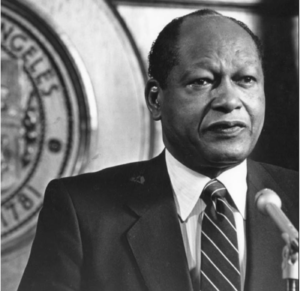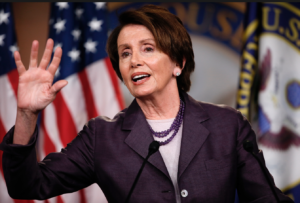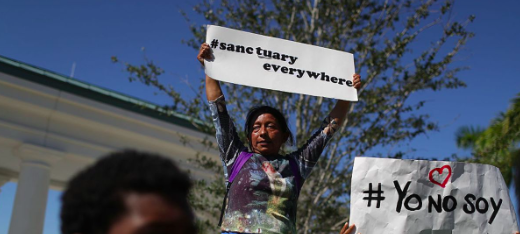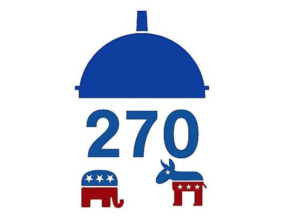Say No to The Olympics in 2024! LA Can't Afford Them
I still fondly remember the 1984's Olympic games hosted here in Los Angeles. I had been living in LA for three years. I was young and green and I felt welcomed in this awesome city. Hence, I immediately endeavored to weave myself into the fabric of this very diverse and awesome community. I managed to understand the forces that were at play in this great city. Indeed, LA's economic, environmental, social, cultural and political forces all manifested themselves in a beautiful struggle.
I am making my case in this piece that our city shouldn't be bidding for these games. As you all know, The US Olympic Committee (USOC) has named Los Angeles as the US bid city for hosting the 2024 games after Boston dropped out. Los Angeles is currently facing daunting problems and I am concerned about the potential financial burden that hosting these games might bring to our city.
Everywhere I turn, I hear the same arguments that LA hosted the games very successfully in 1984. They go on and tell you that the weather was awesome, the competition was fear, the festivities were great for our city, and that the games elevated LA to the world stage. All that is true.
 What is not being said is that all the success achieved didn't just fall off the sky. The two men responsible for said success: Mayor Tom Bradley and local businessman Peter Ueberroth, Both men provided the vision needed for this major worldwide event. Clearly, LA doesn't currently have the leadership of this caliber anymore.
What is not being said is that all the success achieved didn't just fall off the sky. The two men responsible for said success: Mayor Tom Bradley and local businessman Peter Ueberroth, Both men provided the vision needed for this major worldwide event. Clearly, LA doesn't currently have the leadership of this caliber anymore.
It is important to point out that in 1984, Mayor Bradley and Businessman Peter Ueberroth called for a "budget-conscious" in hosting these games. They were keenly aware of the profound financial failures that the city of Montreal had encountered in 1976. They told Angelinos that what had happened in Montreal was not going to happen here in LA. The City of Montreal was held liable for $1.5 billion, the costs exceeded the projected revenues and the city had to pay for the debt. That had meaningful negative implications in the quality of life of the city of Montreal.
 These two LA’s leaders bluntly told the Olympic games’ people that LA was happy to host the games. But, the city was not going to be held responsible for any cost overruns(this term is used when costs exceed revenues). It was a "take it or leave it" proposition. People from the Olympic Games were not happy to hear such proposition and they initially balked. But in the end, Los Angeles was finally relieved from any financial responsibility. And, the rest was history-the 1984's Olympic Games were an utter success. That was also the only time in history that a city had actually made a dime out of these games. This is not the case now. Mayor Garcetti is bidding for these games and Los Angeles will be responsible for any debt in the event that the projected revenues don't pan out.
These two LA’s leaders bluntly told the Olympic games’ people that LA was happy to host the games. But, the city was not going to be held responsible for any cost overruns(this term is used when costs exceed revenues). It was a "take it or leave it" proposition. People from the Olympic Games were not happy to hear such proposition and they initially balked. But in the end, Los Angeles was finally relieved from any financial responsibility. And, the rest was history-the 1984's Olympic Games were an utter success. That was also the only time in history that a city had actually made a dime out of these games. This is not the case now. Mayor Garcetti is bidding for these games and Los Angeles will be responsible for any debt in the event that the projected revenues don't pan out.
Los Angeles, our leaders have been telling us lately, is the best city in the world. It is not just a city of promise but "a city of tremendous innovation and resilience. Our city is the capital of the pacific and we do things well on the international stage. Los Angeles was cut to host this Olympic games-we did it successfully in 1932 and 1984. And, we should be able to do it one more time.” While I wholeheartedly agree with all these adjectives being used here to describe this great city, I join the chorus of others in this city who persuasively argues that the mayor’s optimism that LA will make a profit in hosting these games in 2024 is disconnected to the reality on the ground.
Some background here. The United States Olympic Committee (USOC) selected Boston last winter to host games. Yes, many Bostonians were elated and were looking forward to witnessing these games in 2024. Nevertheless, After carefully examination by civically engaged citizens and other powerful civic groups, Boston's mayor decided not to host the games this past July. They projected that unexpected costs were going to exceed revenues-Boston was not willing to take any risk. Immediately after Boston withdrew, the USOC looked at Los Angeles as the best city to host these games. They reached to Mayor Garcetti and urged the LA mayor to bid for these games. The application's deadline was mid-September the IOC will make announce it in the summer of the next what country will host the games.
The table below is a screenshot taken from the LA24 Bid book presented by the mayor GAMES BUDGET (August 2015)

A quick look at the table above, we can see that the mayor is presenting a proposed contract for total costs of $4.666.2 with the USOC and IOC. The $1.700.0 billion at the far top right is a projection being made by the mayor of the investments made by private organizations. For example, to radically renovate the Coliseum will cost at least $500 million, according to many people familiar with this type of renovation. This will be a sort of private investment needed for this thing to work. USC will have to cough up all the money to convert this stadium into a modern Olympic center. Thus, the overall cost for these games will be at least $5.8 billion [$4.116.2 + $1.7.00] that will not include the contingency and the insurance premium above. The mayor is forcefully arguing that LA will not be liable for anything because after all numbers are computed Los Angeles will actually make $161.1 [net position above] million after broadcast rights, sponsorships, and ticket revenues are brought in. It is interesting that very same projections were made in the Winter Games in Vancouver and in the 2012 Summer Games in London. These two cities encountered major problems in finishing these construction projects
Two problems with the Mayor's projections above. First, most cities tend to find problems with private investments, when private money doesn't come in, cities are liable. Second, the mayor's revenue projections are very small. $161 million out of $4.6 billion is a very small margin and doesn't give enough room to adjust. What if there were a worldwide catastrophe or a worldwide recession and people are unable to travel and attend these games. LA will be liable for all cost overruns. That means the money will have to come from the general fund to cover these costs. Can we afford to take money out of our public safety programs or to eliminate other vital programs needed int this city? Of course not.
 The Mayor's people argue that it makes a lot of sense to host the Olympic Games of 2024 here in our city. For starters, these people claim that LA has the venues and the infrastructure in place. Nothing can go wrong, security is ready to protect athletes and people, all logistics have been figured out and tested-we will succeed. It is not that easy. Hosting these games requires tremendous efforts from all the different sectors that comprise a city. At least seven years are needed to make sure all centers needed are built or fixed.
The Mayor's people argue that it makes a lot of sense to host the Olympic Games of 2024 here in our city. For starters, these people claim that LA has the venues and the infrastructure in place. Nothing can go wrong, security is ready to protect athletes and people, all logistics have been figured out and tested-we will succeed. It is not that easy. Hosting these games requires tremendous efforts from all the different sectors that comprise a city. At least seven years are needed to make sure all centers needed are built or fixed.
In light of the intractable problems facing Los Angeles, can we honestly say that we can host these games? I say no. We have a housing crisis, crime in South Central Los Angeles doesn’t stop, a profound lack of civic engagement among our citizens, and the city still struggles with a faltering and de-industrialized economy that has left many without good jobs. And, we can't ignore the Grand Canyon-size gap between rich and poor in Los Angeles.
The greatness of our city should not be measured by how many Olympic games we host or how many states of the art stadiums and arenas we build. But how we can help those who have lost hope and live in misery in Los Angeles.
Thank you for reading and Happy New Year to all of you...
Who Should Replace Xavier Becerra ?

The race to replace Congressional Representative, Xavier Becerra, is getting interesting. It truly is refreshing to see a bunch of new enthusiastic candidates running for this seat. The finger democracy being used by not very thoughtful people within "establishment" has not worked. We need to encourage more competent people to run. We have been governed by the very same people last two decades. They all start at the Assembly, then they move to the State Senate. Once they are termed out in both houses, then they come to LA to run for the city council. Then, they move to the Board of Supervisors or Congress. We need to break this vicious cycle. We need new leaders. Indeed, we need a new more in-depth level of thinking for solving the daunting problems facing people in our communities.
It is also great to see four women running for this seat, and there is potential for more to join the race. I have been making the case that we need more competent women in elected offices. So far, ten candidates have officially declared that they will be making their case to voters in this district as to why they should be allowed to go to Washington.
This might not longer apply to presidential candidates, but determining whether an individual is ready to represent the collective interest adequately, said a candidate must not only understand the nuances of representation but also she/he must have an innate intellectual understanding of justice. If no candidate never entertained these concepts while doing community work or in his profession, said candidate might not be competent. From The Republic of Plato, there has always been this quest for justice, and it was a complicated concept to understand. However, the definition, at least, how I understood it, was at heart to the virtue of the individual, the order of society, as well as individual rights in contrast to the claims of the general social order." As a member of congress, a member gets tremendous opportunities to be part of the vital conversations of the day, dealing with international affairs, businesses more specifically the financial markets, and domestic policies that must focus on the challenges facing Americans today. Competent candidates must have the ability to elevate themselves above all these noises and make decisions about what is for the best interest of everyone.
The three E's of every election that most political strategists always talk about when assessing candidates are the following: Enthusiasm, excitement, and electability. A candidate must have the ability to generate enthusiasm and excitement among his/her supporters if he/she wants to get elected. Moreover, sometimes, it is a daunting task to accomplish such an endeavor if the candidate lacks adequate resources. Electability is also paramount; most people will open their wallets only to those who can form coalitions and have a chance to get elected.
A candidate who claims that he/she wants to go to Washington because he/she wants to take on Trump, this candidate has not either deeply thought about what the position entails or might just unintentionally be pandering to fear to communities of color. The real challenge for the winner in this race will not be Trump, but the Democratic leadership that is resisting change in light of the profound challenges facing the party. Yes, these leaders have yet to come to terms that the ground has shifted beneath them and that the status quo is no longer acceptable. Whoever wins this thing will be reporting to yes, Nancy Pelosi right after he/she introduces herself to Speaker Ryan.
In most political races, there are always first-tier and second-tier candidates. Not in this congressional race. Former Speaker, John Perez who was the first to declare and then had to drop out because health issues, might have been the only first-tier candidate in this race. Most of the candidates, who have declared that they will be running to replace Becerra, have been involved in some activism, but most of them have not held elected offices. Some of them have worked in the labor movement, and some have worked for non-profit organizations.
Here is the list of candidates so far, according to the Los Angeles Times as of Dec. 22nd 2016: Assemblyman Jimmy Gomez (D-Los Angeles); Wendy Carrillo, a Democratic labor activist; Kenneth Mejia, a Green Party candidate who ran earlier this year as a write-in Democratic candidate against Becerra; Sara Hernandez, former staffer for Councilman Jose Huizar and a Democrat; Arturo Carmona, a Democrat and former top deputy for the Bernie Sanders campaign; Yolie Flores, a former LAUSD board member and a Democrat; Alejandra Campoverdi, Former White House staffer and former LA Times employee; Karl Siganporia, a Republican who previously explored a congressional run as a Democrat; Raymond Meza, a Democrat and labor organizer with SEIU Local 721; Steven Mac, a Democrat and felony prosecutor for Los Angeles County.
Assessing for what I have seen and read so far about the candidates, I can venture to say that Wendy Carrillo has generated enthusiasm, and she also has animated women and young people. She has a compelling life story and has excelled both academically and professionally. Although she will soon have to pivot and she will have to start offering more concrete goals as what she plans to do if she gets elected.
Sara Hernandez appears to have a more refined message dealing with leadership. Moreover, she must since she runs the Coro Foundation, a center for leadership development for public affairs here in LA. [In the interest of full disclosure, I have to say that I spent a year with this foundation as a Coro fellow in 2001-2002]. She comes across somewhat arrogant, though. In the first week, when she was toying with the idea of running-she told her friends that she was considering to run and she raised about $150,000.00. Now that is power. She will have adequate resources to make her case to voters in this district. She is connected to all these Coro's people and to Councilman Jose Huizar.
Assemblymember Jimmy Gomez will claim to have the experience and establishment connections. He also has a legislative record where the competition can look at and use against him. As the establishment candidate, he should have the resources to make his case to the voters in this district too. Jimmy Gomez is getting all the endorsements of those holding public office, both the Mayor and Supervisor Solis have endorsed the Assemblyman. It is interesting to see if the political winds have finally arrived here in LA. The winner of this race should not be the candidates who form coalitions of politicians but the one who brings community people together and can organize an army of unpaid volunteers.
Arturo Carmona has worked with immigrant non-profit organizations. He also had a gig with Bernie Sanders during the primaries. I was taken aback when I read one of the posts on his Facebook page recently. "They rigged the primary against Bernie and then lost the election to an unapologetic misogynist billionaire." He posted on his Facebook. Really, "they rigged the primary against Bernie"? Why does he want to revive the battles of the primaries between Hillary and Sanders? He is being ill-advised or needs better advisors. Why even go there? There is still glass on the wounds as some people, who might be part of this district, still blame Sanders’ supporters for Hillary’s loss.
Alejandra Campoverdi is a former White House staffer, and she also used to work for the LA Times. She has done journalistic work with the immigration issue with Jose Antonio Vargas. She has also worked or currently works for Univision. She appears to be doing very well in her profession, and it is not clear why she is running for this seat. She might be connected at the highest levels of the political establishment in Washington but might not be familiar with the different interests fighting for resources in this district.
Finally, Yolie Flores is a former LAUSD board member and I don’t know who the rest of the candidates are and why they are running. I did google them and couldn't find enough information. I will follow this race as well as other local races that will be taking place the coming year
Thank you for reading.
_____________________________________________________________
References.
Bernal, Rafael. "Race to replace Becerra gets crowded." The Hill. 18, Dec. 2016. Web. Accessed 29, Dec. 2016. <http://thehill.com/latino/310834-race-to-replace-becerra-gets-crowded>.
Braun, Aryn. "California Assemblyman Racking Up Endorsements to Replace Becerra." Roll Call. 15, Dec. 2016. Web. Accessed 30 Dec,2 016. <http://www.rollcall.com/news/politics/becerras-seat-still-up-for-grabs
Mai-Duc, Christine. “Former White House aide, also a former L.A. Times employee, joins candidates vying to succeed Xavier Becerra.” Los Angeles Times. 22, Dec. 2016. Web. Accessed 27, Dec. 2016. <http://www.latimes.com/politics/essential/la-pol-ca-essential-politics-updates-alejandra-campoverdi-congressional-1482367860-htmlstory.html>.
Myers, John. "Former Assembly Speaker John A. Pérez decides against running for Rep. Xavier Becerra's congressional seat." Los Angeles Times. 10, Dec. 2016. Web. Accessed 29, Dec. 2016. <http://www.latimes.com/politics/essential/la-pol-ca-essential-politics-updates-john-p-rez-decides-against-running-for-1481390443-htmlstory.html>.
The Republicans of Plato. Intro. and notes by Francis MacDonald Cornford. Oxford: Oxford UP, 1968. Print.
The end of the Democratic Party as we know it?
“Crisis,” according to Webster’s Dictionary, “is the turning point….the decisive moment.” This is the challenge for the democratic party, endeavoring to find opportunities in these trying times. It will require courage, vision, and action. So far, the actions were taken after the election telegraph a message that this party is not moving towards that direction. Democrats have been playing a counterproductive blaming game, "the FBI director killed our momentum with emails inquiry," "The Russian tipped the scaled for Trump by releasing Podesta's emails," "The Electoral College is anti-democratic," etc.
The party of FDR finds itself in its worst governing position ever.-starting next year, Democrats will control “ 31 legislative chambers and 15 governorships. Moreover, at the federal level in all three branches, Democrats are in the minority as Republicans will have a chance to tip the scale in the supreme court by adding a new conservative justice. There are profound problems of leadership, vision, and complacency. The decision of the Senate Democratic leadership to change the rules of the filibuster back in 2013 was insane. They might have thought that they were going to be in power forever. Now, the President-elect can nominate whomever he pleases to the different essential departments in the executive branch, and there is nothing that the Democrats can do to stop him. At least, they had the wisdom of not changing the rules for Supreme Court justices' nominations.
I vividly remember the day before the presidential election, pundits and experts in the political firmament were writing obituaries for the Republican Party. "Republicans are on the road of perdition," some of them said, "They have ignored minorities, and the party will not win presidential elections with just old white voters," others argued. Yes, how can the Republicans win voters in a rapidly changing America, when they refuse to realign the party’ vision to the contours of a more pluralistic society, many voters asked themselves. It was the Republican Party that was on the brink of collapsing we all thought. Now, it is the Democratic Party that is having a soul-searching, and its future looks bleak if nothing is immediately changed.
 Should the election of Trump be read as a firm rejection of what the Democratic Party stands for? That is, the belief that America as a community is best when it is more inclusive and where those who work hard and play by the rules can do whatever their talent allows them to do to move up on the economic ladder. The latter is what leaders in the democratic party have failed to understand, or at least they have ignored. People in this country are working harder than ever, and yet they are still not able to provide for their families. Overall, the party of FDR has always focused on the message of fairness for everyone willing to work hard.
Should the election of Trump be read as a firm rejection of what the Democratic Party stands for? That is, the belief that America as a community is best when it is more inclusive and where those who work hard and play by the rules can do whatever their talent allows them to do to move up on the economic ladder. The latter is what leaders in the democratic party have failed to understand, or at least they have ignored. People in this country are working harder than ever, and yet they are still not able to provide for their families. Overall, the party of FDR has always focused on the message of fairness for everyone willing to work hard.
Nevertheless, focusing solely on fairness is naive or lacks a profound understanding of the problem. There is no fairness without opportunity. Indeed, workers in this country are unable to provide for their families in this “Uber” or “Wal-Mart” economy. This new economy gives no opportunity for workers to provide for their families sufficiently. This new “gig” economy, as it is often called, creates tremendous opportunities but it created tremendous challenges for workers in this country.
Economic mobility virtually does not exist in America, and most workers feel that Democrats have abandoned them. Many workers believe that democrats have gotten too close to corporate power, and they no longer fight the unchecked corporate greed. Sanders pounded Hillary with this claim in the primaries. Ironically, workers starving for opportunities embraced an economic message coming from a billionaire presidential candidate who sleeps on a golden bed and rides on a golden elevator and who shows no signs of eloquence or ability to articulate a complete policy thought. Latinos also feel disappointed as President Obama promised comprehensive immigration reform and gave them comprehensive immigration enforcement instead.
 The structural problems of leadership in the democratic party are deep and broad. When rational beings are in a hole, they stop digging. It appears that the Democrats are asking for a bigger shovel. One would think that the Democrats would have engaged in a search for new leadership with more innovating ideas. No. They recently elected Nancy Pelosi as the minority leader for the House of Representatives for the next two years. Democrats needed strong, clear-eyed leadership with new progressive policy ideas that could animate the rank and file. Everyone thought Democrats were going to shake up and refocused. Instead, they re-elected Pelosi. A nod to continuity at a time when continuity was not warranted.
The structural problems of leadership in the democratic party are deep and broad. When rational beings are in a hole, they stop digging. It appears that the Democrats are asking for a bigger shovel. One would think that the Democrats would have engaged in a search for new leadership with more innovating ideas. No. They recently elected Nancy Pelosi as the minority leader for the House of Representatives for the next two years. Democrats needed strong, clear-eyed leadership with new progressive policy ideas that could animate the rank and file. Everyone thought Democrats were going to shake up and refocused. Instead, they re-elected Pelosi. A nod to continuity at a time when continuity was not warranted.
These problems are also at the local levels. In the State of California, California Democratic Party Chairman John Burton, an old guy who has been there forever. He is on his way out, and the guy who will replace him is Chair of the Los Angeles CountyDemocratic Party, Eric C. Bauman, another guy who has also been there forever. There is no leadership development at this party. The democratic party in California also needs to have an internal revolution. What they have in place is not sustainable; that game blatantly being played of going along, getting along, and wait for your term has to stop.
The process of reassessing what happened in this past presidential election must be robust, and Democrats must have the courage to make the needed changes to get back in the game. To go aggressively after the uneducated white voters and continue overlooking the needs of minorities in their party will be suicidal. Hillary lost because many Latino and Blacks voters stayed home. One might argue that Trump’s approach to Blacks and Latinos in that speech on a hot day in Ohio sometime in August in which he told them point-blank. “‘What do you have to lose?” might have worked. Trump told these two groups, “you live in poverty in neighborhoods that are more dangerous than war zones.
Furthermore, these cities have been running for Democrats. Give me a chance.” Latinos and Blacks might not have had the courage to vote for this man and might just have decided to stay home, which might have been equated with voting for him, specifically in those states where that Hillary lost by thin margins.
The time has come for a new generation of leadership, and for the Democratic Party, it cannot come soon enough.
Thank you for reading.
___________________________________________________________
Sources Consulted
"Crisis." Entry 1 and 2. Merriam-Webster's Collegiate Dictionary. 9th ed. 1988. Print.
Johnson, Jenna. “Donald Trump to African American and Hispanic voters: ‘What do you have to lose? Washington Post. 22, August 2016. We. Accessed 22, Dec. 2016. <https://www.washingtonpost.com/news/post-politics/wp/2016/08/22/donald-trump-to-african-american-and-hispanic-voters-what-do-you-have-to-lose/?utm_term=.e01378110442>.
Martin, Jonathan and Alexander Burns. “Democrats at Crossroads: Win Back Working-Class Whites, or Let Them Go?” New York Times. 15, Dec 2016. Web. Accessed 15, Dec. 2016. <http://www.nytimes.com/2016/12/15/us/politics/democrats-joe-biden-hillary-clinton.html?smid=fb-nytimes&smtyp=cur>.
Opinions. “Cory Booker, Zephyr Teachout and more on the Democrats’ future.” Washington Post. 18, Nov. 2016. Web. Accessed 20 Dec. 2016. <https://www.washingtonpost.com/opinions/cory-booker-zephyr-teachout-and-more-on-the-democrats-future/2016/11/18/5e20a65e-ace2-11e6-977a-1030f822fc35_story.html?utm_term=.0b1d85f65caf>.
Declare Los Angeles a “Sanctuary City.”
I was taken aback a couple of weeks ago when Mayor Garcetti was quoted in LA Times saying that he avoids using the phrase ‘sanctuary city,’ because “it’s ‘ill-defined.” In addition, he told the Times, “we cooperate all the time with federal immigration officials when there are criminals that are in our midst and need to be deported.” This came right after Mayor Garcetti held a brief conversation with the President-Elect, Trump. I was mystified that advocates for undocumented immigrants in this city because they either said very little or didn’t say anything at all. Really, one of the most progressive cities in America might not be a "sanctuary city"? So, if the mayor and other civic leaders in this city know that this city might technically not be a “sanctuary city” why not start the process right away and officially declare Los Angeles a “sanctuary city”? I remember very vividly when a week after Trump got elected many council members and the mayor appeared on TV or issued statements and defiantly told Trump that the LA was going to protect its immigrants. I thought our civic leaders were showing spine when they made those statements since "LA is slated to receive $500 million from the federal government this fiscal year plus $23 million for federal housing.”
Any data about the demographics show that Los Angeles has approximately 1. 5 million foreign-born people, 850,000 of these foreign borns are undocumented. The outcome of the recent presidential election will test our LA civic leaders’ resolve in protecting our undocumented immigrants. President-Elect Trump took a hard line against undocumented immigrants while campaigning for the White House. It was his signature issue and he promised to go after cities that would not cooperate with immigration authorities in deporting undocumented immigrants. Reince Priebus who has been chosen to serve as Trump’s chief staff also told CNN that “a city that ignores federal laws and still wants the federal government to help them is an inconsistent position.”
Among leaders in progressive cities in this country, New York City's Mayor, Bill de Blasio stands out as being very vocal and defiant to the President-Elect Trump in protecting his city’s undocumented residents. Bill de Blasio point black told the President-elect Trump that he was not going to back away from policies that protect immigrants living illegally in his city, even if that means cuts to his city’s budget.
Unlike Los Angeles, Mayors in Philadelphia, San Francisco, and Chicago have also sent strong messages to the President-Elect that they will fight back any effort to deport undocumented immigrants, while calling their cities “sanctuary cities,” San Francisco has taken it to a new level in defending its undocumented immigrants-they have enacted policies that specifically avoid cooperating with federal authorities. The city of San Francisco has enacted a policy into law called “Due Process for All.” An ordinance that prohibits local enforcement agencies from holding undocumented immigrants for ICE. No undocumented or legal immigrant with no violent felonies on their records or are being accused of any felony charges are reported to ICE. Why doesn’t LA has something like this? It is not enough to have the Chief Back telling us that we will not cooperate with ICE. How will we know that this is being carried out as promised?
The death of Kate Steinle in 2015 who was shot and killed in San Francisco by an undocumented immigrant and repeat felon who had been deported many times in the past gave ammunition to the anti-immigration forces and candidate Trump while he was campaigning not just about “illegal immigration’ but also about the purpose of sanctuary cities in this country.
 But what exactly constitutes a sanctuary jurisdiction? It is not clear what this legal or political definition is but it is the term used to describe cities, counties or states in this country that go to great lengths to protect non-criminal undocumented immigrants from being deported. These cities accomplish this goal by limiting or utterly refusing to cooperate with federal authorities in charge of enforcing immigration policies in this country. Some cities specifically enact policies into ordinances that mandate protection of undocumented immigrants others cities just have their civic leaders to pledge that protection. The main goal for sanctuary cities is to make sure that undocumented immigrants report crimes, look for medical care when needed, and that they enroll their children in school without the fear that they will be reported to federal authorities for being undocumented in this country.
But what exactly constitutes a sanctuary jurisdiction? It is not clear what this legal or political definition is but it is the term used to describe cities, counties or states in this country that go to great lengths to protect non-criminal undocumented immigrants from being deported. These cities accomplish this goal by limiting or utterly refusing to cooperate with federal authorities in charge of enforcing immigration policies in this country. Some cities specifically enact policies into ordinances that mandate protection of undocumented immigrants others cities just have their civic leaders to pledge that protection. The main goal for sanctuary cities is to make sure that undocumented immigrants report crimes, look for medical care when needed, and that they enroll their children in school without the fear that they will be reported to federal authorities for being undocumented in this country.
Cities that do not protect undocumented immigrants and “Immigration Detainers” The Immigration Customs Enforcement-ICE has a set of categories of violation of laws in which undocumented immigrants who have been arrested could be subject to deportation. Misdemeanors and traffic violations might be part of these categories. Once a red flag has been raised by the local law enforcement agency when an undocumented individual has been arrested then ICE makes an official request. The police department holding the undocumented individual lets ICE knows before releasing said, individual. ICE then arrange a time to pick up the undocumented person and starts the deportation process. The constitutionality of this process has been questioned by some legal scholars who argue that these individuals’ due process rights might be in violation since ICE might not have arrest warrants for these individuals. In addition, these “detainers” are issued when individuals are just accused of committing a crime. Undocumented individuals might eventually be found not guilty or charges might be dropped for lack of evidence. This is problematic, undocumented individuals just need to be accused of a crime to subject to deportation. These are very profound violations of these individuals’ constitutional rights. And these detainers can also be used for legal immigrants.
Civic Leaders in Los Angeles can do better and they should declare this city a "sanctuary city" as soon as possible. LA should also mirror what the city of San Francisco is doing protecting its undocumented immigrants. Sanctuary cities are about protecting law-abiding undocumented hardworking immigrants who are an integral part of the fabric of many cities in this nation. Sanctuary cities are not what the anti-immigration forces argue, these cities do not provide “additional privileges, not available to citizens and legal immigrants, to criminal "aliens."
Thank you for reading.
__________________________________________________________________________
Works Cited
Carcamo, Cindy, Kate Mather and Dakota Smith. “Trump's crackdown on illegal immigration leaves a lot unanswered for sanctuary cities like L.A.” Los Angeles Times, 15 Nov. 2016. Web. Accessed 4 Dec. 2016. <http://www.latimes.com/local/lanow/la-me-sanctuary-cities-20161114-story.html>.
Feldman, Noah. “Sanctuary Cities Are Safe, Thanks to Conservatives.” Bloomberg View. 29 Nov. 2016. Web. Accessed 5 Dec. 2016. <https://www.bloomberg.com/view/articles/2016-11-29/sanctuary-cities-are-safe-thanks-to-conservatives>.
“Immigration Detainers: A Comprehensive Look,” American Immigration Council. 17 Feb. 2010. Web. Accessed 5 Dec. 2016
Lee, Ye Hee Michelle. “What exactly are ‘sanctuary cities’ in immigration policy?” Washington Post, 7 Sept. 2016. Web. Accessed 6 Dec. 2016. <https://www.washingtonpost.com/news/fact-checker/wp/2016/09/07/what-exactly-are-sanctuary-cities-in-immigration-policy/?utm_term=.effd5ffdca3f>.
Smith, Morgan and Jay Root. “Jails Refused to Hold Thousands of Immigrants for Feds.” Texas Tribune, 15 Jan. 2016. Web. Accessed 5 Dec. 2016. <https://www.texastribune.org/2016/01/15/34-texas-counties-declined-hold-deportable-immigra/>.
Valverde, Miriam. “New York City mayor says the president can't defund sanctuary cities 'across the board.” Politifact, 18 Nov. 2016. Web. Accessed 5th Dec. 2016. <http://www.politifact.com/truth-o-meter/statements/2016/dec/01/bill-de-blasio/new-york-city-mayor-says-president-cant-defund-san/>.
“What are sanctuary cities? “ Economist Explains, 22nd Nov. 2016. Web. Accessed 4 Dec. 2016. <http://www.economist.com/blogs/economist-explains/2016/11/economist-explains-13>.
The Electoral College and the “Popular Vote.”
 Most people are still puzzled and cannot fathom as to why La Hillary got about two more million votes than Trump, and she is still not moving into 1600 Pennsylvania Avenue next January. A straightforward American political system is not “pure democracy.”
Most people are still puzzled and cannot fathom as to why La Hillary got about two more million votes than Trump, and she is still not moving into 1600 Pennsylvania Avenue next January. A straightforward American political system is not “pure democracy.”
I agree with pundits and the political class that argued that Hillary didn’t have an economic message for uneducated whites who were disgusted with the economic and cultural transitions that this country is going through. Also, five states that voted for Obama in 2008 and 2012 voter for Trump. Yes, Iowa, Wisconsin, Ohio, Pennsylvania, and Florida, they all went for Trump.
For those who think that it is undemocratic for a candidate to get the majority of votes and still losing an election, you should know that this country does not have a full-fledged democratic political system. In essay ten in the Federalist Papers, Madison addresses the problem with democracies, ”they are spectacles of turbulence and contention, and there is nothing the protect the weaker party.” The Framers saw democracies as a threat to freedom and even argued that these systems were just some sort of transitional political systems that will eventually lead to anarchy. “A Republic,” Madison argues, in this very same essay, in which “the scheme of representation takes place,” will be more equipped to protect the “weaker party’ which he meant the minority. And in essay 39, Madison fully defined what he meant by a "Republic," “we may define a republic to be, or at least may bestow that name on, a government which derives all its powers directly or indirectly from the great body of the people, and is administered by persons holding their offices during pleasure, for a limited period, or during good behavior.” Yes, "directly or indirectly," the powers will come from the people. Electing the judicial people and the executive individual, voters will have no direct involvement in the process.
Going back to the "popular vote," forty-eight states use the “popular vote” to allocate electors to the two presidential candidates. Although It is possible that when all the votes are collectively counted one candidate might get the majority of votes but still loses the election. Now with Hillary, this has happened five times throughout history. Anybody who is blaming the Electoral College should ask a simple question: Why hasn’t Hillary said anything about the Electoral College? Because she knows blaming the Electoral College is silly. She blamed the FBI. I have heard many people making moot arguments and even starting a petition drive to get rid of the Electoral College. It is not that easy, in order to get rid of the Electoral College, the Constitution needs to be amended. That will require 2/3 members of the House of Representatives and 2/3 of members of the United States Senate to approve a said amendment. Then, 3/4 of the states have to agree to such an amendment. There must be a robust movement for this thing to happen.
Debating the Constitution in 1787, the framers disagreed over two fundamental questions: What democratic process should be used in electing the Presidents? Second, What theory of Federalism should be utilized in electing the head of this branch? This was a heated debate and there were other proposals put forth in this convention but were rejected. One of them proposed that Congress should have the sole responsibility to elect presidents. Nevertheless, the Hamilton and Madison thought that would be too divisive and it would also go against their vision of having a political arrangement with separate powers. In the end, they decided to embrace a process in between. This process is fully explained in Article ll, Section 1 of the Constitution.
Every four years, voters in this country like to engage in futile exercises-they want to get rid of this institution. This is how the Electoral College works: The number of electors assigned to each state is based on the number of representatives that each has in both houses of Congress. That is, California has 53 House of Representatives and two US Senators in the Senate. Therefore, California has 55 electors in the Electoral College being the largest delegation. In total, there are 438 houses of representatives and 100 Senators totaling 538 electors. A presidential candidate needs to get 50% + 1 of these 538 electors to become president, which is 270 electors' votes [538/2 = 269+1 = 270].
All the states but Nebraska and Maine practice what is called “the Winner Takes All,” which means that the presidential candidate who gets the majority of votes in a particular state, that candidate will get all the electors from that state. Nebraska and Maine distribute the votes proportionately based on the percentage of votes a presidential candidate gets. Okay, let us use this table below to illustrate how this process works. Let us say we have three states, and each state gets one elector for every ten residents, then State A will get ten electors since it has 100 residents and so forth for the other two states. In-state A on election day, La Hillary will have won all electors since she just got way more than the 51% of the votes needed. She got 80 votes. She lost the other two states, and Trump won the election. Since more electors voted for him because he got more votes in the other two states, La Hillary got the "popular vote," and Trump won the election.
Larger states might give the candidate who lost the election the majority of votes. I looked up the number of votes each candidate got here in the State of California, and if one looks at the table below, Hillary got almost four million more votes than Trump. This might be the very reason as to why she got the national popular vote. It is also important to point out that Trump did not spend a dime in California for the apparent reason that he had no chance here.

Had Hillary won votes in states where it was consequential, we would have a new president-elect today If she had won just one hundred thousand mores votes in all these three states below where the election was very closed: Wisconsin, Pennsylvania, and Michigan, she would have won this election. I want to point out that there is movement currently going on to have a recount in these states.

The Electoral College is in alignment with the federal system in which much power rests with the states. Yes, the state can change the way how electors can be chosen.
Finally, I want to say that I was privileged to be one of the 55 electors in 2004 here in the State of California. The other fifty-four electors who were with me that day in Sacramento were connected to the political power and some of them are currently holding elected office-Mitch O’ferrel and Ted Lieu being a couple of them. Reading the Federalist Papers, I was utterly taken aback by the description of electors in these essays and the actual electors gathered that day. Here is the list of those electors that day some of you might know people on this list.
http://elections.cdn.sos.ca.gov/statewide-elections/2004-general/elector_list_2004.pdf
Thank you for reading.
____________________________________________________________________
Works Cited
California Secretary of State, California General Election. “President - Statewide Results.” Web. Accessed 27 Nov. 2016.
Epstein, Richard A. "Are you smarter than the constitution? The founders knew what they were doing." Hoover Digest, no. 2, 2013, p. 67+. Academic OneFile, www. go.galegroup.com. Accessed 27 Nov. 2016.
Hamilton, Alexander, James Madison, John Jay. The Federalist Papers. Ed. Clinton Rossiter, and Charles R. Kesler. New York, N.Y: Mentor, 1999. Print.
Richie, Robert, and Andrea Levien. "How the 2012 presidential election has strengthened the movement for the National Popular Vote plan." Presidential Studies Quarterly, vol. 43, no. 2, 2013, p. 353+. Academic OneFile, www.go.galegroup.com. Accessed 27 Nov. 2016.
Savage, G. David. “Colonial-era legacy that has modern implications.” Los Angeles Times 11 Nov. 2016: A7. Print.
